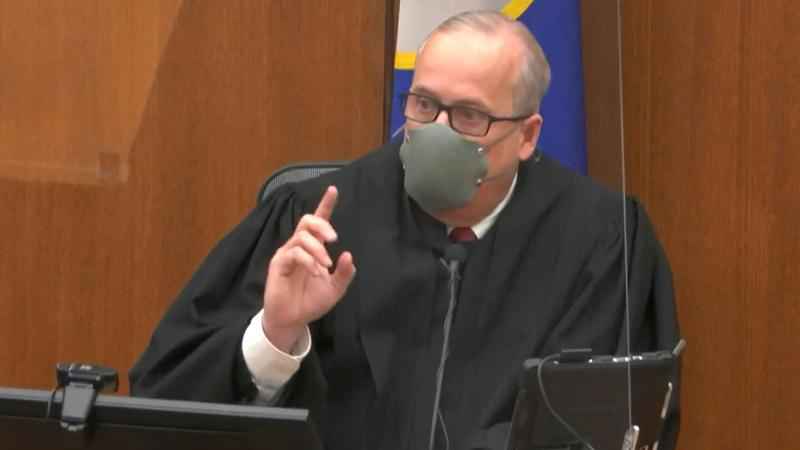Afternoon session in Chauvin trial continues as defense medical expert resumes witness stand

Hennepin County Judge Peter Cahill.[Courtroom Video]
3:44 p.m.
The judge has adjourned the day in court. Jurors will come back tomorrow morning, starting around 9:15 to 9:30 a.m.
3:15 p.m.
The defense is redirecting Fowler now.
Fowler says heavier people are more likely to cause injury, reflecting on Floyd’s stature.
Forgot to Tweet.
— Ana Lastra (@AnaViLastra) April 14, 2021
Eric Nelson is re-directing Dr. Fowler. He’s asking about the report Blackwell brought up about positional asphyxiation.#DerekChauvinTrial
N: Did it appear to you that Mr. Chauvin then had a tight firm grip around Mr. Floyd’s neck?
— Ana Lastra (@AnaViLastra) April 14, 2021
DF: No, actually looked very loose and the hand was actually gripping the back of the neck and the sort of spinal column area with a considerable gap in the front. #DerekChauvinTrial
Jerry Blackwell takes over again.
— Callan Gray (@CallanGrayNews) April 14, 2021
Blackwell, "Did you make any theoretical measurements of the EELV as part of your analysis…"
Dr. Fowler says no.
1:30 p.m.
State prosecutor Jerry Blackwell starts his cross-examination of the witness, Dr. David Fowler.
Jerry Blackwell is asking Dr. Fowler about Derek Chauvin’s weight. Dr. Fowler says it’s true he didn’t factor in the weight of Chauvin’s gear in his analysis. #DerekChauvinTrial
— Ana Lastra (@AnaViLastra) April 14, 2021
Fowler says he did not factor the weight of Chauvin’s police belt he was wearing at the time of the incident. He only noted Chauvin’s weight in his review, 140 pounds.
He also tells the state that there was no finding of carbon monoxide poisoning in Floyd’s system. Fowler stated this morning to the defense that carbon monoxide "could have" been a factor.
"But the key thing for breathing is that you need to be able to expand your chest. If you can’t expand your chest, you can’t breathe," Blackwell asked.
"You need to expand the capacity of the chest cavity so that the lungs draw in as part of the process," Fowler responded.
He also confirmed that if one applies pressure to someone’s neck and squeezes until the person becomes unresponsive and maintains that pressure for at least four minutes, it can cause irreversible brain damage, because the brain would be starved of oxygen.
Blackwell shows Dr. Fowler a training text for forensic pathologists, "Are you aware this text on medical, legal investigation of death, it contains a section on deaths by asphyxia?"
— Callan Gray (@CallanGrayNews) April 14, 2021
Dr. Fowler agrees. pic.twitter.com/xkxfq1g5aa
Blackwell is asking questions that were referenced during Dr. Tobin’s testimony.
Dr. Fowler: I typically do not do pulmonary medicine so the exact ranges of human beings are not something that I classically keep in my head, so I don’t know that number, Counselor. #DerekChauvinTrial
— Ana Lastra (@AnaViLastra) April 14, 2021
Blackwell asks about movement of Floyd’s leg, ".. it’s fair to say when we see an anoxic seizure, at the very least, we know that the brain is suffering from insufficient oxygen?"
— Callan Gray (@CallanGrayNews) April 14, 2021
Dr. Fowler, "Yes."
During the cross-examination, Fowler acknowledged that Floyd may have survived if officers had provided medical attention.
The court takes a 20-minute recess at 2:55 p.m. with Fowler still on the witness stand.
George Floyd died of a sudden heart rhythm problem due to his heart disease while being restrained by police, a retired forensic pathologist testified for the defense Wednesday at former Officer Derek Chauvin’s murder trial, contradicting several experts who said Floyd succumbed to a lack of oxygen.
Dr. David Fowler, a former chief medical examiner for the state of Maryland and now a member of a consulting firm, said the fentanyl and methamphetamine in Floyd’s system, and possible carbon monoxide poisoning from auto exhaust, were contributing factors. He said Floyd’s heart disease included high blood pressure and narrowing of the arteries.
See what happened Wednesday morning here
Hennepin County Judge Peter Cahill says the court will be back in session starting at 1:30 p.m.